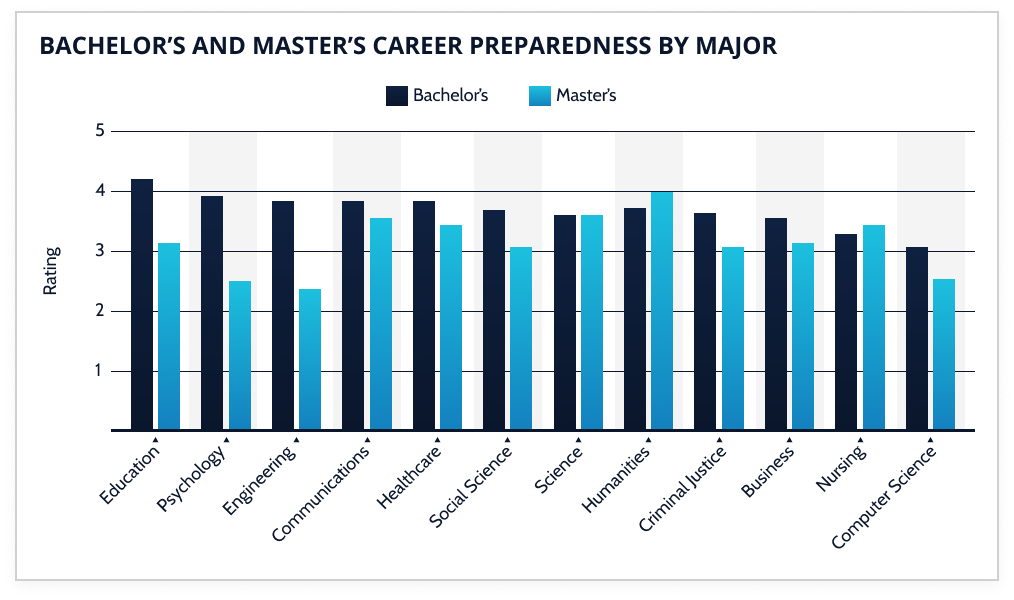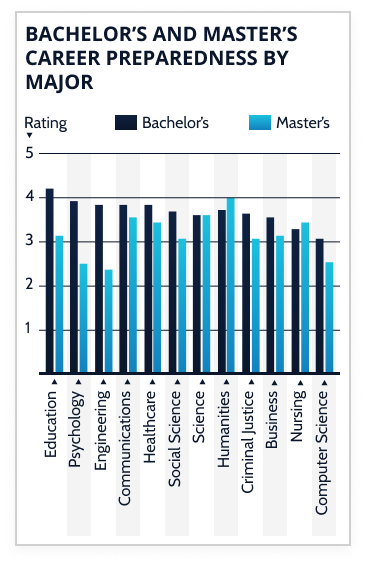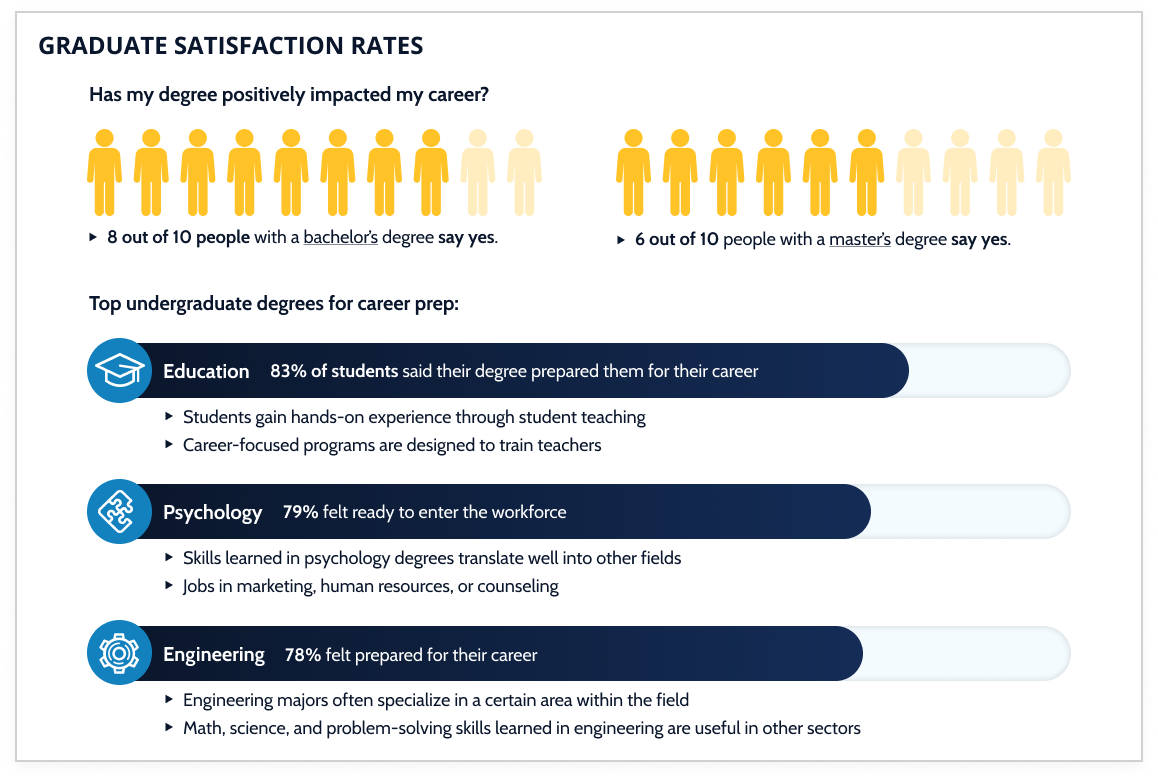Which Majors do People Feel Prepare them Most for Their Careers?
When choosing a major, one of the biggest things to consider is how it will impact your career. This question is driving a growing number of students toward “hard skills” majors, such as computer science and engineering, over humanities and liberal arts degrees.
As the tech industry becomes more lucrative, STEM degrees are increasingly seen as the ticket to a stable, high-paying job. In recent years, humanities and liberal arts degrees have gained a reputation as programs with little payoff.
However, employers in tech and across other industries are now expressing the need for employees with the skills learned in a humanities degree – communication, critical thinking, and an ability to understand and interpret the world around you.
As the cost of a college degree rises, so does the pressure to make sure your education is worth the price. When choosing a major, students need to know how their degree will advance their career. Will their education prepare them to enter the job market?
To help answer these questions, we analyzed thousands of student reviews of colleges and universities left on GradReports as well as our sister site, Graduate Programs, over the last three years. We combed through 5,768 individual reviews of schools and programs to determine which majors were best preparing students for their careers.
When it comes to college applications, online reviews have the most significant impact on where students choose to enroll. These reviews are left voluntarily by current students and graduates who visit our websites, and their insights help people choose which program is the best fit for their needs and goals.
We wanted to know which majors were most effective and applicable for students after they leave college. To look at this, we categorized student reviews based on major* to determine which programs helped students feel ready when entering the workforce.
We were surprised by what we found – humanities and social science majors felt most prepared for their careers, and computer science majors felt particularly unprepared.
Students also reported being more satisfied with the career impact of a bachelor’s degree than a master’s degree, even though the latter is often a more career-specific program.
*We broke down majors into the following categories to determine which subjects helped prepare graduates most for their careers: Business, Communications, Computer Science/IT, Criminal Justice, Education, Engineering, Healthcare, Humanities, Psychology, Science/Math, and Social Science.
Key Findings
Bachelor's degrees were reported to have a positive impact on people's careers at a much higher rate than master's degrees- 82% of people who graduated with a bachelor’s degree were satisfied with the impact their education had on their career vs. 58% of people who earned a master’s degree
- 75% of people felt their bachelor’s degree prepared them for their career vs. 66% of people with a master’s degree
- Bachelor’s degrees in education and psychology did best for career preparation
- Humanities did best at the master’s level, followed by science/math
- At the bachelor’s level, computer science majors felt least prepared, while engineering students felt least prepared at the master’s level
Bachelor’s degrees scored better for career prep and impact than master’s degrees
While 82% of those with bachelor’s degrees felt their education impacted their career, just 58% of master’s degree holders were satisfied with the impact their degree had.
Overall, we found that people were more satisfied with the impact their bachelor’s degree had on their career than a master’s degree. As master’s programs are designed to be more career-specific, this was surprising.
This disparity in satisfaction rates may be due in part to the different expectations people have of bachelor’s and master’s programs. Undergraduate degrees are designed to give students experience in a range of disciplines and teach skills that are applicable for many careers.
Graduate studies are often concentrated on a particular career path or field, which means when a master’s program doesn’t help students meet specific career goals, it’s less likely to benefit them in a different type of role.
Additionally, master's programs can be a significant investment because graduate students don’t qualify for need-based federal grants such as the Pell grant, so they may foot more of the bill than undergraduate students.
Those who earned bachelor’s degrees said their education experience was well-rounded, allowing them to learn a range of skills they can apply professionally.
Our analysis of student reviews show people feel 24% less satisfied with the impact their master’s degree had on their career and felt 9% less prepared for their careers than those with bachelor’s degrees.
Many reviews said making connections and being involved in the campus community helped get their career off the ground. Reasons for this included developing a professional network, gaining exposure to their field through hands-on club projects, and learning leadership skills.
Dedicated, inspiring professors were also frequently mentioned. Students said professors were well-versed in their fields and pushed students to succeed.
“Each professor I had cared deeply about my education and encouraged me to excel inside and outside of the classroom by pursuing research opportunities and being co-author on various publications,” Christopher Newport University graduate Christina B. wrote in a review of her psychology program.
People also felt more prepared for their careers with bachelor’s degrees – three out of four undergraduates felt ready when entering the field. Comparatively, just two-thirds of those with master’s degrees felt prepared for their career.
“There was very little hands-on technical teaching, which in today’s world is what employers are looking for and a lot of students desire,” University of Maryland Global Campus graduate Conrad wrote of his Master’s in Cyber Security program.
Conrad was not alone in his sentiment – Our analysis of student reviews show people feel 24% less satisfied with the impact their master’s degree had on their career and felt 9% less prepared for their careers than those with bachelor’s degrees.
As master’s degrees are typically seen as venues to advance your career, this finding surprised us. Our data suggests many people feel their graduate studies didn’t live up to their expectations.
This may be due in part to the significant leap students take when they go from a high school education to an undergraduate degree. Two-thirds of college students are ages 18-24, and they gain a wealth of cognitive and practical skills and real-world experience during these formative years.
The difference in skills and education gained from a bachelor’s to a master’s degree is likely less significant, which may be why bachelor’s degree holders feel more prepared to enter the workforce.
Education and psychology undergraduates were the most career-ready
For undergraduate degrees, we found that education majors most often felt ready to enter the workforce – 83% of students said their degree prepared them for their career.
This is likely because most people major in education to become a teacher, and programs are closely tied to a career in the field.
Arizona State University graduate Hannah G., now in her second year of teaching, said that her Early Childhood Education program allowed her to be an effective and thorough teacher.
“I felt truly prepared for all aspects of my job and I had made strong connections with professors and peers that allowed me to reach out in moments of doubt,” she wrote in her review.
Most education programs are hands-on, requiring students to complete a practicum in the classroom to graduate and become licensed. This gives future teachers plenty of real-world experience and skills they can directly apply later on.
“The College of Education at Louisiana State University-Shreveport did an excellent job at preparing me to be an educator. I entered the school system with lots of knowledge, tools, and confidence,” Nicole F. wrote in her review of Louisiana State University. “They ensured that I had a variety of hands-on experience combined with professors that truly committed themselves to our education and preparation.”
Those who studied psychology also fared well, closely followed by those with degrees in engineering, communications, and healthcare.
We found that 79% of psychology students felt ready to enter the workforce, which may be due to the subject’s versatility. Those who study social sciences can often translate the skills learned into many roles, including marketing, human resources, or counseling.
“My time as a psychology student was incredible, as both of my departmental professors were passionate and sought to help each student succeed,” wrote Melinda B. in her review of Baker University. “These professors, along with many other professors, impacted my worldview and my future as a mental health therapist.”
For undergraduate degrees, we found that education majors most often felt ready to enter the workforce – 83% of students said their degree prepared them for their career.
Engineering majors, 78% of whom felt prepared by their career, typically learn the hard skills necessary for the workforce during their degree programs.
“I think that the way that the university and especially the Grainger College of Engineering stands out is the resources they are able to provide for their students – which put you on the best road to success,” Adrianna C. wrote in her review of University of Illinois Urbana - Champaign. “Through the college I was able to attend career fairs, which landed my first internship, which led to a full time offer.”
Online bachelor’s degrees in communications, social science, and humanities fared best for career preparation. Four in five communications majors said their degree prepared them for their careers, while 73% of social science majors and 72% of humanities majors said they felt ready to enter the workforce.
Many student reviews for online undergraduate programs specifically mentioned that their new degree qualified them for higher salaries and more positions. Those who found their online classes challenging and had to apply themselves often felt their education was rewarding and beneficial.
This may be reflective of the number of opportunities opened up to them simply by having a degree. The majority of online college students work full time and use the flexibility of remote learning to fit education into a busy schedule. They may see a stark difference in their career opportunities before and after earning a degree.
“I can say that I feel confident entering the job market. If you’re looking for flexibility like myself, this would be the best choice,” Sasha S. wrote in her review of the Communication and Media Studies program at King University. “I’m a full-time employee, new mother, and full-time student – flexibility is a must.”
One concern many have with pursuing an online education is the logistics of learning the hard skills needed for careers in healthcare, education, and other hands-on roles. Online programs often address this by requiring students to complete fieldwork at a convenient location, such as student teaching in their school district or interning at a medical clinic near their home.
As most higher education institutions have transitioned to online due to COVID-19, facilitating students’ opportunities to complete fieldwork has become increasingly difficult. Programs have had to get creative by changing requirements and providing new opportunities for students to learn virtually.
Some nursing programs now use telehealth, simulations, and virtual reality to provide hands-on experience during the pandemic, and student teachers are adapting to online classrooms.
“My favorite aspect of the social work program was the field placement. Our last semester consisted of a field seminar class once every other week and 400 hours interning at the agency we were placed in,” Drew O. wrote in a review of Florida Atlantic University’s Bachelor of Social Work program. “I learned much more than I imagined I would.”
Graduate students felt most prepared in humanities, math and science, and healthcare
At the master’s level, students from significantly different fields were happy with how their degrees helped them advance their careers. Four out of five grad students who studied humanities felt career-ready, which may be surprising given our earlier findings.
Many humanities majors become professors or instructors, which require at least a master’s degree. Extensive study in their area of expertise, coupled with the communication and critical thinking skills often learned in humanities, can set graduates up for a successful career in academia.
The idea that it is difficult to find a job or make enough money with a degree in humanities has contributed to a shift in recent years. Students are now opting for majors viewed as more lucrative, such as those in STEM, over degrees in humanities and social sciences.
Some people are surprised to find that humanities majors are employed, happy with their careers, and satisfied with their salaries, even though they earn less money on average than computer science or engineering majors.
Master’s degrees in math and science, nursing, and healthcare also performed well compared to other fields at the graduate level. Three out of four math and science majors and 70% of those who studied nursing and healthcare felt their degree prepared them for a career.
Math and science may have fared well because a master’s degree is required for many roles in fields such as environmental science, chemistry, and biology.
Completing a master’s in nursing helped people feel more prepared for their careers than other majors. Master’s in nursing programs allow for higher pay, better hours, and more job opportunities. Students also get the extensive hands-on experience they’ll need to enter the field and pass clinical certification exams.
Nursing and humanities degrees also performed best out of all online master’s programs. Nearly three-quarters of online nursing students felt prepared with their master’s degree, and 69% of humanities graduates said they felt ready for their careers.
“Professors did an excellent job preparing students for the real world of nursing practice,” Xavier University graduate Caroline N. wrote in her review of their online direct entry nursing program. “From the first semester, students were required to attend clinicals at different healthcare organizations, in and around the city of Cincinnati.”
Master’s degrees in math and science, nursing, and healthcare also performed well compared to other fields at the graduate level. Three out of four math and science majors and 70% of those who studied nursing and healthcare felt their degree prepared them for a career.
Across degree levels, computer science majors felt especially unprepared
Overall, those who earned a bachelor’s or master’s degree in computer science felt particularly unprepared for their careers.
Just 57% of computer science majors felt prepared after their bachelor’s and master’s degrees, and 58% were satisfied with the impact their degree had on their career.
These findings surprised us. As degrees in computer science and related fields are often seen as hands-on and teach high demand skills, we expected these students to feel more prepared.
This could be due to the impostor syndrome that many developers feel when entering the software development field. Since the technology world is continuously changing and evolving, software developers often feel unprepared for their careers or out of place.
The industry is full of talented, highly intelligent, and productive people, and developers may feel inadequate if they struggle to keep up with learning new coding languages or skills.
Review data can help students choose the best programs to prepare for their careers
Our reviews indicate that people with bachelor’s degrees generally feel their degrees positively impacted their career prospects and prepared them to enter the field.
While we often think of degrees in STEM as being particularly effective in career preparation, our data show students in education and psychology degree programs are actually most satisfied and prepared to enter the workforce.
Overall, graduates were significantly less satisfied with master’s programs. Certain degrees performed well, including humanities, nursing, and math/science.
In contrast, less than half of computer science and engineering students at the master’s level were happy with the impact their education had on their career.
While students should take personal interest and career goals into account when choosing a major, our data show that those earning bachelor’s degrees in education, psychology, engineering, and communications will likely feel ready to enter the workforce post-graduation.
When it comes to selecting a school, student reviews can help applicants choose a program that best fits their needs. Those considering applying to graduate school can also use these data to figure out if a master’s degree will help them achieve their career goals. Graduate students studying engineering, psychology, and computer science majors may need to be more selective than those with master’s degrees in other subjects to ensure they’ll graduate with the skills they need.




